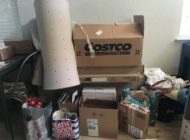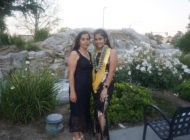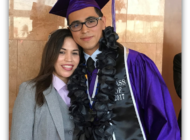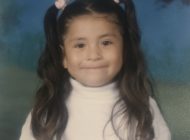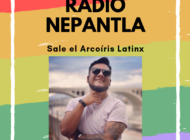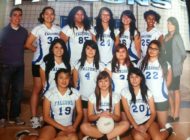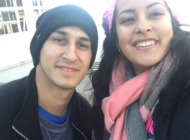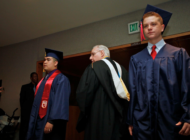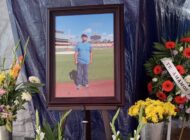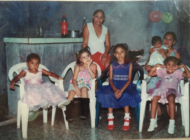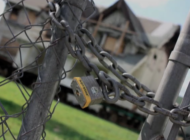By VIRGINIA BULACIO
EL NUEVO SOL
The mayor of Los Angeles, Antonio Villaraigosa, talks about domestic violence to a group of students at Fairfax High School

Break the Cycle, offers services, education and workshops to help youths affected by domestic violence. Photo: Virginia Bulacio
Luis Hernández, who graduated from Fairfax High School in Los Angeles, came back to his school to attend the lecture of a politician offered to a group of young people.
Although students were used to seeing him as a public figure, they are dazzled by the confession of the first Latino mayor elected in Los Angeles in the last hundred years: His mother was abused by his father until she learned to defend herself and get out of hell she was living in.
“Being a victim of domestic violence, I think it is very important to talk to young people, so they can learn the importance of not letting a man hit you in a relationship. Most of the time these young girls and teenagers think it is acceptable … and what we are doing with this campaign is to educate young people to not let a man treat them that way,” says Antonio Villaraigosa.
For Luis, the lecture of the mayor was inspiring and he says that the best way to overcome violence is to change yourself and focus on your goals.
“I was always listening to what my dad was saying to my mom and that really hurt me,” says Luis who graduated from Fairfax High School over a year ago. He explained that some of the experiences he had in his childhood made him grow and become more responsible in his life.
Villaraigosa says he has been working for many years against domestic violence, but he is now focusing on cases among teenagers.
“The truth is that my mom was the one who educated us,” says Villaraigosa. “And I grew up watching that, so I knew that it was not acceptable for a man to hit a woman.”
Approximately one out of three teenagers in the United States have been victims of physical, emotional or verbal abuse by their dating partners, a number that exceeds other types of violence affecting teenagers in the United States.
One of the main problems for the victims that are mothers it that they do not feel quite ready to move forward by themselves. They feel the need to seek financial support and that their children grow up with a father, says Julisa Lendo, a psychologist and director of Amanecer Community Counseling Services, a nonprofit organization in Los Angeles who works with families affected in domestic violence.
“One thing that most victims have in common is that they are denying that domestic violence is affecting their children. The victims think that the abuse has only had an impact on them, but in reality the violence affects the entire family,” explains Lendo.
Luis identifies himself with the story because he was a victim of domestic violence: “I was a little kid, but I understood what was happening and it hurt me to listen to the words that he [my dad] said to my mom.”
The problem is most critical in a very young age. The FVPF reports that women between the ages of 16 to 24 have a higher risk of being sexually abused, while teenagers between the ages of 18 to 19 experience a highest rate of sexual harassment. This organization has launched a campaign called “That’s not Cool”, that works with social networking sites like Facebook and MySpace to promote awareness and prevention, aimed specifically at young people and teens.
Studies from this organization have shown that girls between 18 and 19 are the ones with the highest rates of harassment. It should also be mentioned that 15.5 million children in U.S. live in families where there has been at least one act of domestic violence in the past year.
A major consequence is that children tend to see domestic violence in their families as something common, and as they enter the stage of puberty they continue the cycle of domestic violence, whether among friends or in their relationships.
Lendo says that one way to end domestic violence is by educating people on the subject.
Luis wants to continue studying and get a good job. He points out that when he has his own family, he will not let the same thing happen again: “Maybe [this] experience will help, so when I have kids and a family I will not make the same mistakes,” he says, “before me, God is first, and when I have my children, I’ll give them everything I can.”
Tags: adolecencia Amanecer Community Counseling Services Antonio Villaraigosa Break the Cycle Centro de Prevención de Violencia Centros para el Control Coaching Boys into Men Domestic Violence Educación Fairfax High School Family Violence Prevention Fund Students That's Not Cool Violencia doméstica Virginia Bulacio







